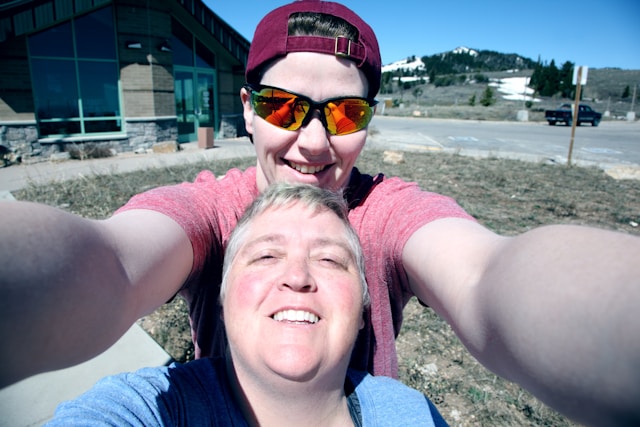Not everyone is born with a perfect understanding of their own sexuality.

There are a variety of reasons it might take someone a while — even decades! — to realise where they fall on the scale of attraction, and coming out later in life, while rewarding, is also accompanied by its own set of challenges. If you only recognised or accepted your queerness in recent years, you may resonate with these experiences.
1. You might feel like you’re going through a second adolescence.

Coming out later in life often brings a rush of new experiences and emotions. You’ll likely start exploring your identity, experimenting with your style, and navigating new social scenes. This period can feel exhilarating and overwhelming, much like a second adolescence. It’s normal to feel both excited and a bit out of your depth as you discover new aspects of yourself and your community.
2. Some people may question the validity of your identity.

Unfortunately, you might encounter people who doubt your newly expressed identity, suggesting it’s “just a phase” or that you’re confused. Their scepticism can be hurtful and frustrating, especially when it comes from friends or family. Remember that your journey of self-discovery is valid, regardless of when it happens. Your identity is yours to define, and you don’t owe anyone an explanation or justification for your truth.
3. You may need to renegotiate existing relationships.

Coming out can majorly impact your existing relationships, especially long-term partnerships or marriages. You might need to have awkward conversations about the future of these relationships, redefine boundaries, or navigate co-parenting in new ways. While they can be tough, these discussions can lead to more authentic connections and mutual understanding, even if the nature of the relationship changes.
4. Finding your place in the LGBTQIA+ community can take time.

Entering the LGBTQIA+ community as an older adult can feel daunting. You might feel out of place at first, unsure of social norms or cultural references. It’s okay to take your time finding your niche. Remember that the community is diverse, with spaces and groups for people of all ages and experiences. Don’t be afraid to explore different social circles until you find where you feel most comfortable.
5. You might experience a mix of grief and liberation.
 Source: Unsplash
Source: Unsplash Coming out later in life often brings a complex mix of emotions. While there’s often a sense of freedom and authenticity, you might also feel grief for the years spent not living openly. It’s normal to wonder about missed opportunities or different life paths. Acknowledge these feelings as part of your journey. Many find that the joy of living authentically ultimately outweighs the sense of lost time.
6. Your coming out process might be more public than you expect.
 Source: Unsplash
Source: Unsplash In the age of social media, news can spread quickly. You might find that your coming out becomes more public than you initially intended. This can be overwhelming, as you navigate not just personal conversations but also broader social announcements. It’s okay to set boundaries and control your narrative. Remember, you get to decide how and when to share your story.
7. You may need to educate people, including healthcare providers.

Coming out later in life might mean educating people in your life about LGBTQIA+ issues, including sometimes surprising sources like healthcare providers. You may encounter doctors or therapists who aren’t well-versed in LGBTQIA+ health concerns for older adults. While it can be frustrating, advocating for yourself and seeking out queer-friendly healthcare can lead to better overall care and support.
8. Your relationships with your children might change.

If you have children, coming out can massively impact these relationships. Reactions can vary widely — some children may be immediately supportive, while others might struggle to adjust. Be prepared for a range of emotions and give your children time to process. Open, honest communication is key. Many families find that this experience ultimately brings them closer together, creating a new level of authenticity and understanding.
9. You might face ageism within the LGBTQIA+ community.

While the community is generally welcoming, you might encounter ageism, particularly in certain social scenes. Some spaces may feel geared towards younger people, which can be disheartening. However, there are many groups and events specifically for LGBTQIA+ people who have come out later in life. Seeking these out can provide a sense of belonging and connection with people who share similar experiences.
10. Your career might be affected.

Coming out later in life can have professional implications. Depending on your workplace and industry, you might face challenges or discrimination. On the other hand, many people find that being open at work improves their job satisfaction and productivity. Consider researching your company’s policies and LGBTQIA+ employee resources. Many find that authenticity in the workplace ultimately leads to more fulfilling professional lives.
11. You may need to redefine your concept of family.

Coming out can sometimes lead to strained relationships with biological family members. However, many people discover the concept of chosen family within the LGBTQIA+ community. You might form deep, familial bonds with friends and community members who accept and support you fully. This network can provide crucial emotional support and a sense of belonging, especially if relationships with biological family become complicated.
12. Financial considerations may arise.

Coming out later in life can have financial implications, especially if it leads to big life changes like divorce or moving. You might need to navigate property division, alimony, or changes in retirement plans. It’s wise to consult with financial advisors who have experience with LGBTQIA+ clients to understand your options and plan for your future.
13. Your past experiences might be viewed in a new light.

After coming out, you might begin re-evaluating past experiences through your new lens of self-understanding. Memories, relationships, and life choices might take on new meanings. This retrospection can be both enlightening and emotionally challenging. It’s a normal part of the process and can contribute to a deeper understanding of yourself and your journey.
14. You may experience a surge of creativity.
 Source: Unsplash
Source: Unsplash Many people report feeling a boost in creativity after coming out later in life. The authenticity and freedom of expression often extend beyond sexuality or gender identity into other areas of life. You might start exploring new hobbies, revisiting old passions, or expressing yourself in ways you never have before. Embrace this creative energy as part of your journey of self-discovery.
15. Your sense of time and future might shift.

Coming out later in life often brings a renewed sense of possibility for the future. You might find yourself making plans and dreaming in ways you haven’t for years. At the same time, there can be a sense of urgency to make up for lost time. It’s important to balance this enthusiasm with patience, allowing yourself time to adjust and grow into your new life. Remember, it’s never too late to live authentically and pursue happiness.




